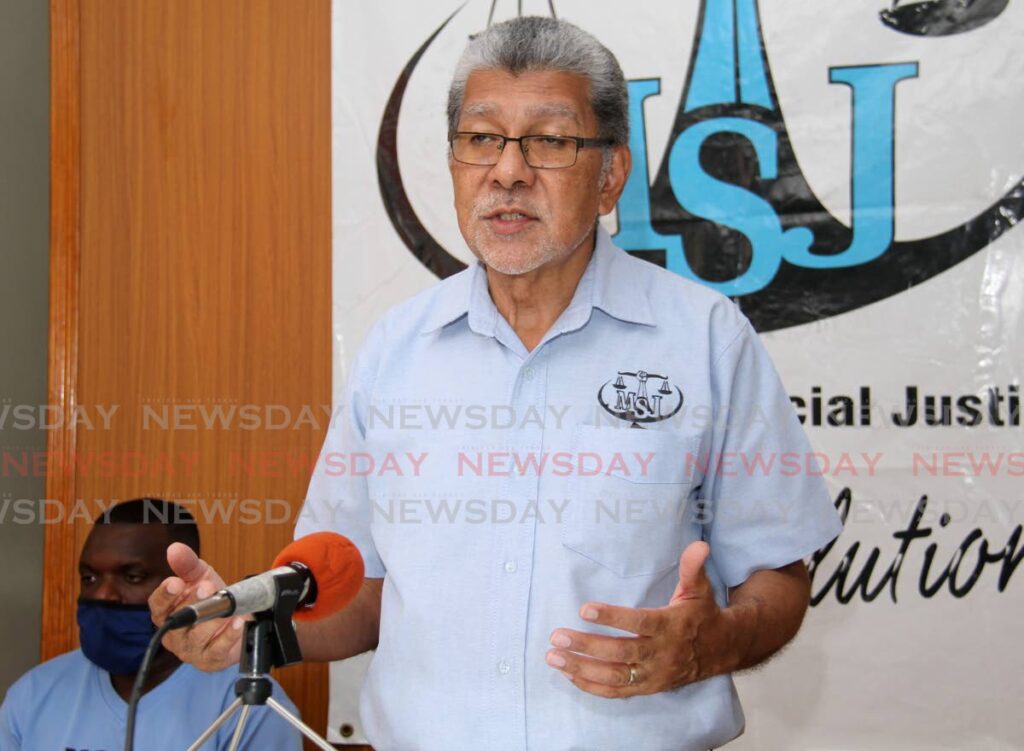MSJ: Extend property evaluation forms deadline, shelve revenue authority plan

TWO days before the November 30 deadline for the submission of property evaluation forms, Finance Minister Colm Imbert and his Government are being asked to give people more time to comply.
Various chambers of commerce, as well as former finance minister Karen Nunez-Tesheira, who brought the property tax bill to the Parliament under a Patrick Manning administration in 2009, have advocated for a deferral as far as 2025.
At a virtual news conference on Sunday, political leader of the Movement for Social Justice (MSJ) David Abdulah expressed support for the postponement.
Abdulah forwarded as his rationale the onerous task of filling out the forms and the $5,000 fine which may be imposed on those who fail to meet Tuesday’s deadline.
Imbert said in the Parliament last week that only 165,000 homeowners had filed the forms – 35,000 short of the 200,000 homeowners required to begin the implementation process for the contentious property tax..
Abdulah referred to former president of the Joint Consultative Council for the Construction Industry (JCC) Afra Raymond, a supporter of Government’s attempts to collect property tax.
However, he noted that Raymond, who is doubtful about its implementation any time soon, has observed that owners of industrial and commercial properties are the majority of those adhering to the deadline.
Abdulah said it is significant that ordinary homeowners and not owners of industrial and commercial properties are the ones who are being targeted in the first instance.
“We believe that it shouldn’t be homeowners who should start to pay property tax. We feel it should start with the industrial and commercial property owners, because they are generating revenue. They are earning income. And industrial property owners at Point Lisas, for instance, they are earning US currency.
“A fair and equitable way to go about it is to start with the industrial and commercial owners, not individuals who have not had a salary increase for five and six and ten years, having to face higher food and other prices.”
Abdulah also opined that he did not agree or accept the need for a Trinidad and Tobago revenue authority (TTRA) in order to increase tax compliance.
He said this can be done within the existing Board of Inland Revenue (BIR) structure. He said tax experts have argued for Customs and BIR to remain separate entities because of their different functions and culture.
He said Government would be splitting the function of collection of information from that of enforcement, and conflict will arise from the hiring of a board.
Abdulah said the way in which Government is setting up the TTRA has many far-reaching implications because the revenue authority will have a board appointed by the line minister and not the public service.
Regardless of the minister, or the party to which he or she belongs, he said there is a history of poor governance. He referred to the collapse of the Bliss Seepersad-chaired Police Service Commission (PSC), which was appointed by the President.
He said whether reality or not, the perception of boards appointed by the minister will be viewed as political appointees.
“Jump high or jump low, the political reality in TT is that with the deep divisions along the lines of party, race, geography, religion and so many fault lines in our society, any revenue authority board appointed, the perception would be that actions and decisions of that board would be political in nature.
“That is not a good position for TT.”
While he understands the loss of revenue, especially in the last year with the onset of covid 19, Abdulah said there are other ways to increase revenue.


Comments
"MSJ: Extend property evaluation forms deadline, shelve revenue authority plan"